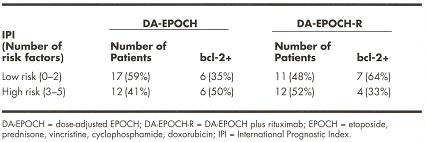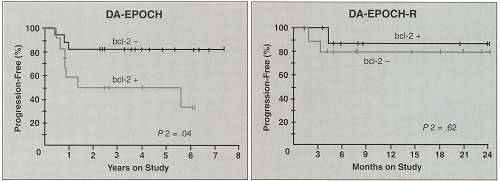Rituximab May Overcome bcl-2–Associated Chemotherapy Resistance in Untreated Diffuse Large B-Cell Lymphomas
The antiapoptotic protein bcl-2 is associated with chemotherapy failure in untreated large B-cell lymphomas, and with the recently described poor-prognosis large B-cell lymphoma subtype displaying an activated B-cell genotype (Nature 403:503, 2000).
The antiapoptotic protein bcl-2 is associated with chemotherapy failure in untreated large B-cell lymphomas, and with the recently described poor-prognosis large B-cell lymphoma subtype displaying an activated B-cell genotype (Nature 403:503, 2000). In vitro, rituximab (Rituxan) down-regulates bcl-2 and sensitizes B-cell lymphomas to chemotherapy (Clin Cancer Res 7:709, 2001).
To assess if rituximab reduces bcl-2-associated failure, we have analyzed bcl-2 expression and clinical outcome from two different studies using dose-adjusted EPOCH (DA-EPOCH) alone or DA-EPOCH with rituximab (DA-EPOCH-R) (375 mg/m² of rituximab IV infusion day 1; 200 mg/m² of etoposide, 1.6 mg/m² of vincristine, and 40 mg/m² of doxorubicin IV continuous infusion × 96 hours days 1 to 5; 750 mg/m² of cyclophosphamide IV day 5 and 60 mg/m² of oral prednisone bid days 1 to 5; granulocyte colony-stimulating factor (G-CSF, Neupogen) at 5 µg/kg/d SC day 6 to neutrophil recovery. Etoposide, doxorubicin, and cyclophosphamide were escalated 20% each cycle to achieve an absolute neutrophil count nadir of less than 500/µL.
Patients received six to eight cycles every 3 weeks and no radiation. Eligibility and treatment were identical in both studies except for the use of rituximab. bcl-2 staining was available in 29/50 patients on DA-EPOCH and in 23/28 patients on DA-EPOCH-R. bcl-2 intensity was analyzed in tumor cells by immunohistochemistry and scored as 0 (none), 1 (< surrounding T cells), 2 (= T cells), and 3 (> T cells). Tumor cells were scored positive if bcl-2 was ³ 1. The International Prognostic Index (IPI) distribution of bcl-2-positive cases and patient characteristics were similar in both studies, which had a median age of 46 (range: 20-73) and 48 (range: 22-75), respectively.

IPI risk categories were not significantly associated with progression-free survival in DA-EPOCH or DA-EPOCH-R. bcl-2-positivity was significantly associated with a shorter progression-free survival in DA-EPOCH (50% and 82% at 24 months; P2 = .039) but not in DA-EPOCH-R (88% and 82% at 24 months; P2 = .62).

Although the median follow-up of 9 months for DA-EPOCH-R is short, all but two progressions on DA-EPOCH (median follow-up of 52 months) occurred within 10 months. Presently, no patients have progressed after achieving a complete response on DA-EPOCH-R.
CONCLUSION: These results suggest rituximab may overcome bcl-2-associated chemotherapy failure, but does not alter the progression-free survival of bcl-2-negative patients. Patient accrual and follow-up are ongoing with DA-EPOCH-R to confirm these findings.
Click here to read Dr. Bruce Cheson's commentary on this abstract.
Highlighting Insights From the Marginal Zone Lymphoma Workshop
Clinicians outline the significance of the MZL Workshop, where a gathering of international experts in the field discussed updates in the disease state.
Late Hepatic Recurrence From Granulosa Cell Tumor: A Case Report
Granulosa cell tumors exhibit late recurrence and rare hepatic metastasis, emphasizing the need for lifelong surveillance in affected patients.